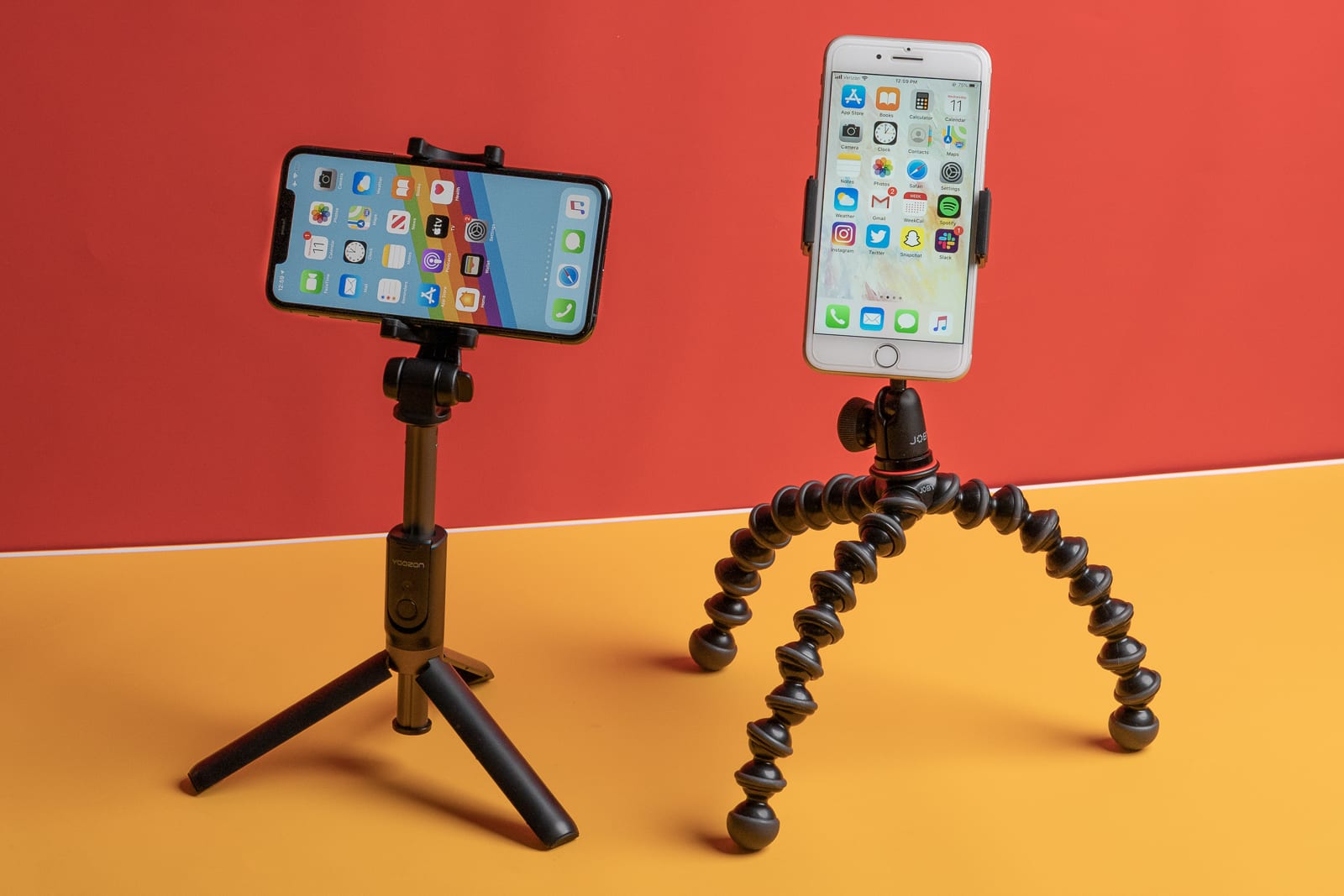
By Erin Lodi and Signe Brewster
This post was done in partnership with Wirecutter. When readers choose to buy Wirecutter's independently chosen editorial picks, Wirecutter and Engadget may earn affiliate commission. Read the full guide to tripods for iPhones and other smartphones.
If you've ever compared who has the longest arms to take a group selfie or struggled to keep your smartphone stable while shooting video, a tripod and mount made specifically for phones might make your life easier. We recommend using the Joby GorillaPod 1K Kit and the Square Jellyfish Metal Spring Tripod Mount together as the best smartphone tripod and mount, after testing dozens of options along the trails of the Pacific Northwest, in the urban forests of Minnesota, and on the streets of Seattle.
If you use your smartphone for low-light photography, time-lapses, selfies, or slow-motion video—or if you just like putting your phone in places that you can't easily reach by hand—this pair holds any smartphone steady at any angle, yet the GorillaPod and Square Jellyfish combo is still small enough to toss into your shoulder bag.
Joby's GorillaPod 1K Kit is stronger and more flexible than anything else out there for the price. The ball-head mount moves smoothly and the long, articulated legs wrap around most anything, such as a tree branch or street signpost. At 10.24 inches from mount to foot, it's about 4 inches longer than most of the no-name, cheaper options; this gives it more reach for selfies and can help it wrap around thicker branches and posts. Additionally, its 2.2-pound weight limit is enough to support most compact cameras and even some mirrorless setups.
Unlike other models we looked at, the Square Jellyfish mount can hold a large smartphone stable in portrait or landscape orientation even without a stand. As small as a set of keys, the Square Jellyfish mount easily holds an iPhone 11 Pro Max and is stable enough to stand on its own in both vertical and horizontal orientations even without a tripod. Just make sure you get the metal mount version because there are user reports of the threads, which let you attach the mount to any standard tripod screw, wearing out over time on the cheaper plastic one. We chose to pair the Square Jellyfish with the GorillaPod 1K Kit because it is a more secure mount than the one that Joby pairs with its other kits.
If you need both a selfie stick and a tripod, the Yoozon Selfie Stick is an affordable two-in-one that quickly transforms from a telescoping arm extender to a tabletop tripod. It can't grip a tree branch or street sign like the GorillaPod 1K, but it does come with a stick-of-gum-sized Bluetooth trigger—pair it with your phone and press its button to grab shots from afar.
Why you should trust us
Erin Lodi is a photojournalist, writer, and professional photographer with a wide range of experience researching, testing, and writing about photography trends, techniques, and tools, including her role as mobile-imaging editor at DPReview, the most popular camera site on the Web.Signe Brewster is a photography enthusiast who writes Wirecutter's guides to photography drones and gimbals. When she isn't capturing videos from the sky, she likes to photograph Minnesota's Victorian architecture with an iPhone 6S.
Who should use a smartphone mount and tripod
Anyone who likes to use the timer function in their phone's camera app, stabilize their video, or shoot videos hands-free can benefit from a smartphone mount.Most tripods are made for cameras, with no way to securely attach a smartphone. A smartphone mount, which usually takes the form of a clamp that grabs onto the sides of a phone, is an adapter that changes that.
The pool of people who will benefit from a smartphone-specific tripod is smaller. A regular tripod, which we cover in our guides to tripods and travel tripods, will work for a phone in most situations. However, the tripods we cover in this guide are uniquely built to function as selfie sticks or grab onto structures like signposts or trees. They're also smaller than traditional tripods, which means you can casually throw one into a backpack instead of lugging around a gadget the size of a baseball bat. But they aren't nearly as long as traditional tripods, which means you must attach them to another tall object to grab an eye-height shot; you're out of luck in an open field. As a result, you should treat a smartphone tripod as a portable alternative, but understand that a traditional tripod is useful in more scenarios.
How we picked and tested
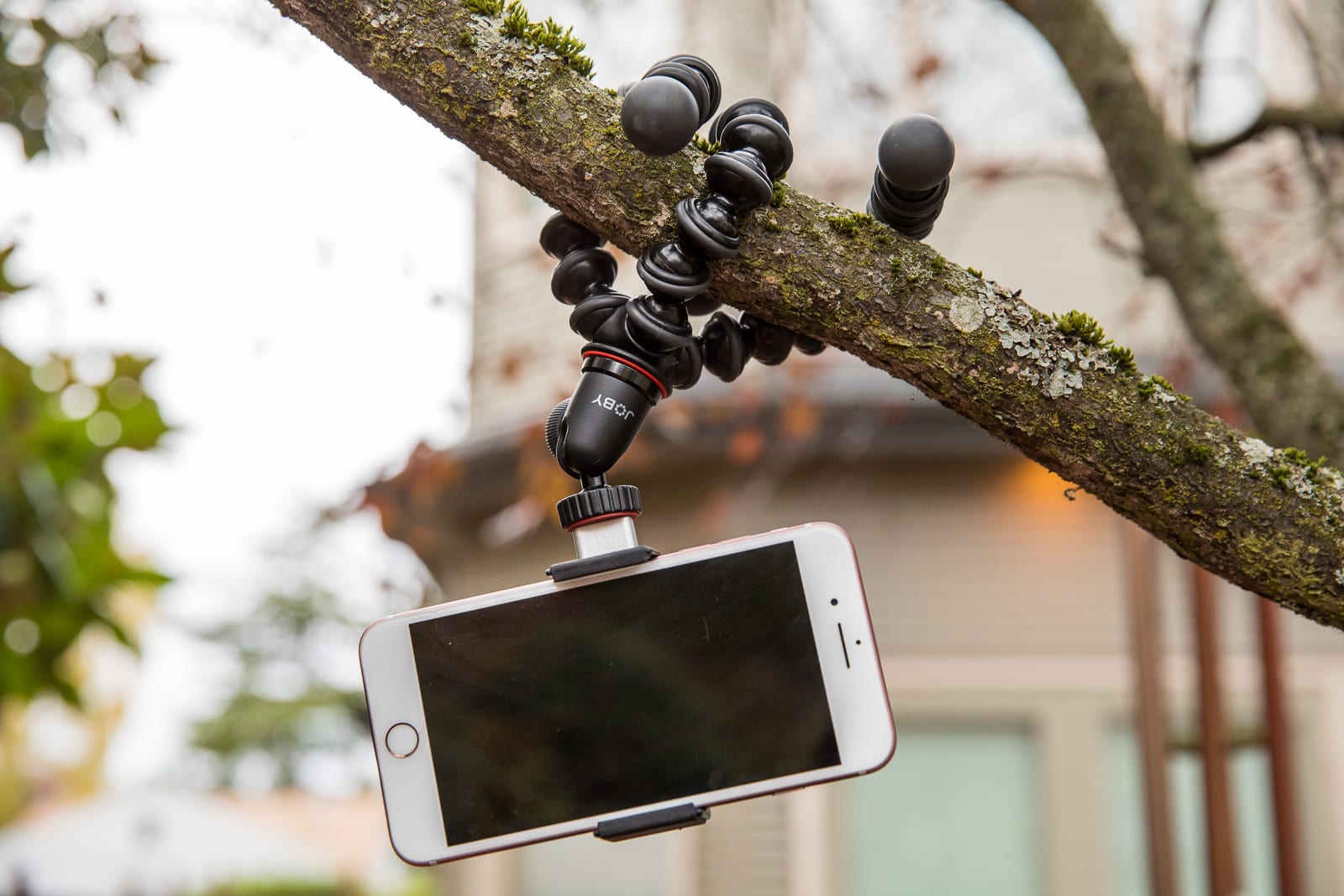
As with standard-size tripods and travel tripods, we considered legs and mounts separately (in this case, looking at phone mounts rather than the ball heads intended for full-size cameras). We tested legs to confirm that they were sturdy enough to support the weight of the smartphone and mount, and we tested the grippiness of their feet on a variety of surfaces.
We examined mounts to make sure they could securely hold smartphones as large as a cased iPhone XS Max, and as small as a Samsung Galaxy S7 without a case. We tested how easily we could make positional adjustments, giving extra credit to smartphone mounts that were able to serve on their own as makeshift stands. We also considered several all-in-one units, those with legs and an integrated mount. Ultimately, we realized we wanted a mount that could slip into a pocket easily, securely mount a smartphone to most tripod legs, and work alone to keep the phone upright in landscape or portrait position.
Portability was a primary consideration for both, because the best accessories for your most portable camera should also slip into a pocket or small bag.
Our pick for best smartphone tripod: Joby GorillaPod 1K Kit
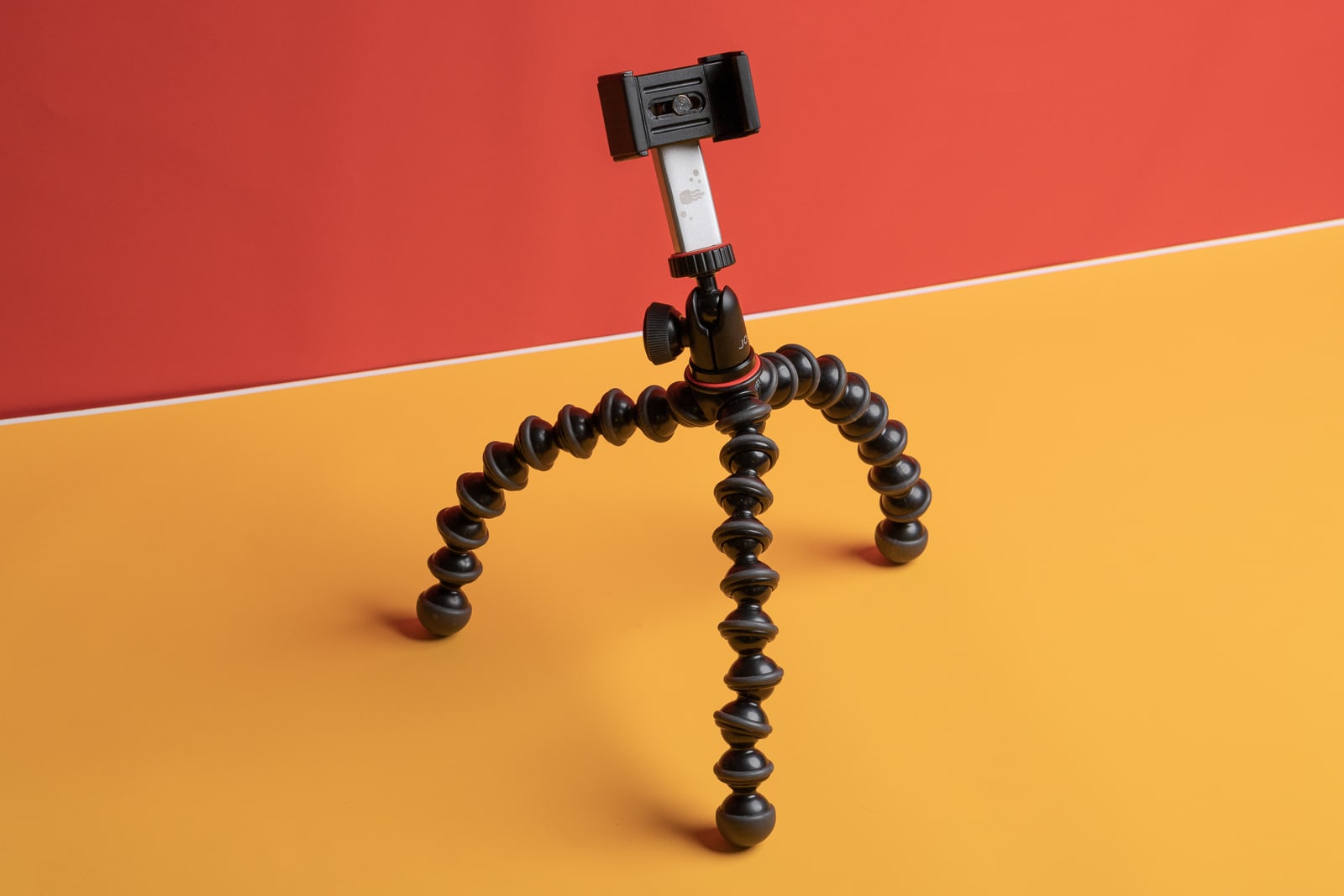
The GorillaPod 1K's signature flexible, jointed legs can bend into just about any position, and once you place them, they stay put. In our tests, cheaper models slipped a bit when nudged lightly. You can even wrap the Joby's legs around a pole or branch so that you can get in the shot by using a timer or a remote. And because they're so long (about 8 inches), you can find purchase on a wider variety of poles and branches compared with smaller tripods with legs less than 5 inches long.
Most important, the sturdy GorillaPod 1K's 2.2-pound weight capacity has no problem keeping larger smartphones like the iPhone XS steady—something a number of other tested stands, such as the wobbly MonoShot, couldn't do. It's even strong enough to hold up a compact or mirrorless camera.
Beyond nailing the basics, the GorillaPod 1K Kit also features a removable ball-head mount. The rotating ball head lets you make small, incremental camera position changes without moving the legs, a feature that came in handy when we switched between portrait and landscape orientation. Rubbery material on the oversize feet provided a better grip on slippery surfaces compared with the smaller feet found on the cheaper legs we tested.
Paired, the Joby legs and the Square Jellyfish mount collapse to the size of a small water bottle and weigh about as much as a navel orange. The resulting combo is easy to tote along in your bag or a larger coat pocket.
As a bonus, the Joby model is strong enough to serve as an especially small tripod for a large point-and-shoot, superzoom, or small mirrorless camera, whereas cheaper competitors struggle to deal with even a large tablet.
Flaws but not dealbreakers
Joby's multi-jointed GorillaPod 1K legs are a little unwieldy at times, making you feel as if you were playing with a toy rather than using a tripod—but then again, you can't wrap your normal tripod around a tree branch. The GorillaPod 1K is also bigger than some of Joby's other leg systems, but we think the extra stability is worth the trade-off.
Like all of the multi-joint-leg tripods we tested, the GorillaPod 1K has its limits. Heavy jostling or hits cause it to slide down slick surfaces such as poles; don't attach it to the handles of your four-wheeler and expect it to stay secure.
The best smartphone tripod mount: Square Jellyfish Metal Spring Tripod Mount
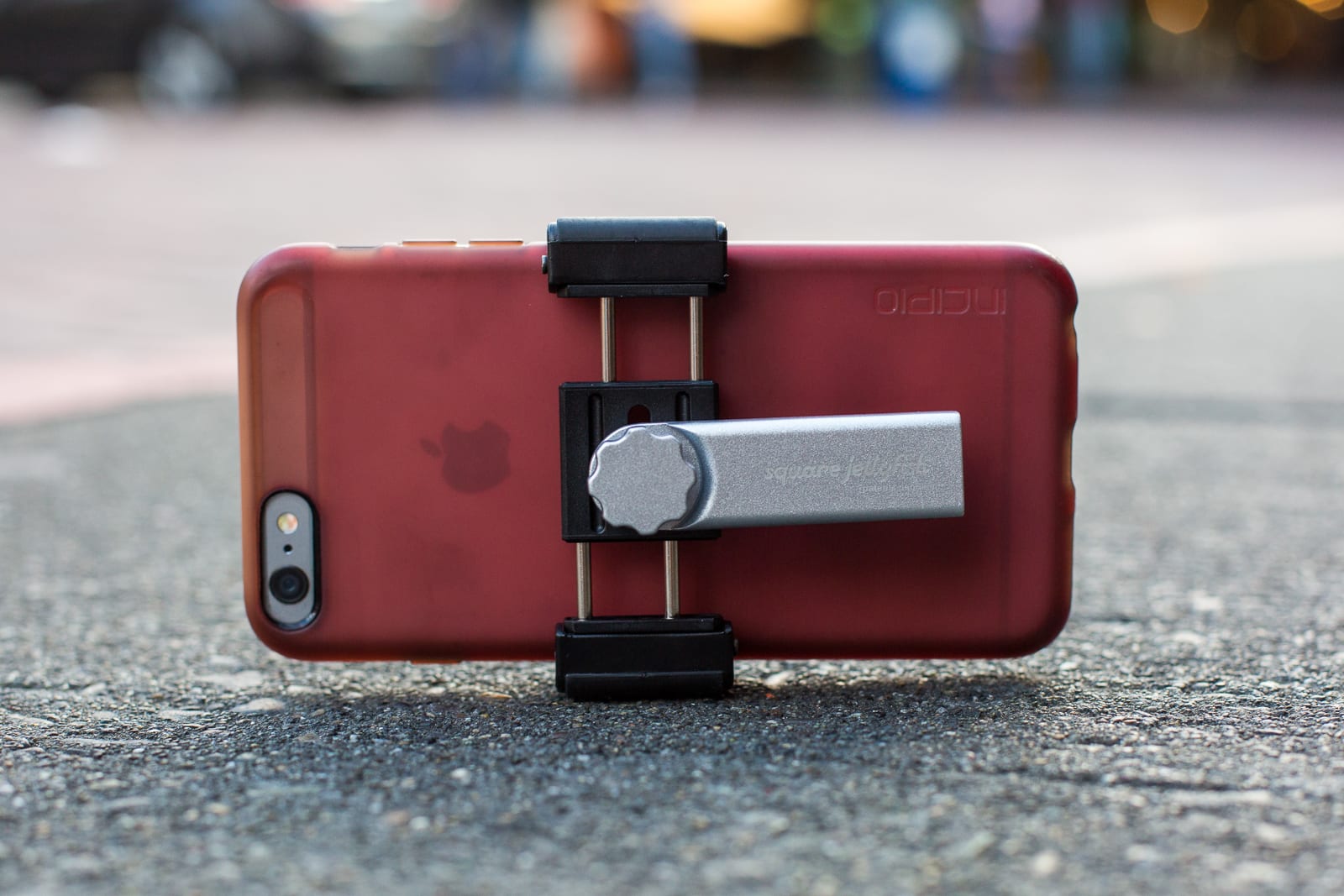
When attached to a tripod, the mount lets you easily rotate your phone 360 degrees; alternatively, for those spur-of-the-moment times when you need to take a photo or video hands-free, use the mount on its own to keep your smartphone standing upright in either portrait or landscape position. It even works if you're using a weighty smartphone lens attachment. We've seen a few other products that serve a similar function, but of the models we tested, the Square Jellyfish mount holds phones the most securely, is the easiest to attach, and allows for a quick flip from landscape to portrait orientation. Other models we looked at, like the DaVoice Cell Phone Tripod Adapter, can support a phone only propped up at an angle when used without legs—not perpendicular to whatever surface you have them on—making them hard to use on their own.
The Square Jellyfish mount holds phones from 2¼ to 3⅝ inches wide, a range that covers the majority of currently available phones but doesn't account for some notably large tablets. An iPhone XS Max or Pixel 2 XL will be fine, but you will run into problems with anything that has a screen size of 6½ inches or larger.
Although Amazon reviews are for the most part very positive, a small number of owners have run into quality problems—primarily stripped threads from overtightening—but these seem to have cropped up with the basic black plastic version. We recommend you get the silver-colored metal version of the mount.
Also great: Yoozon Selfie Stick
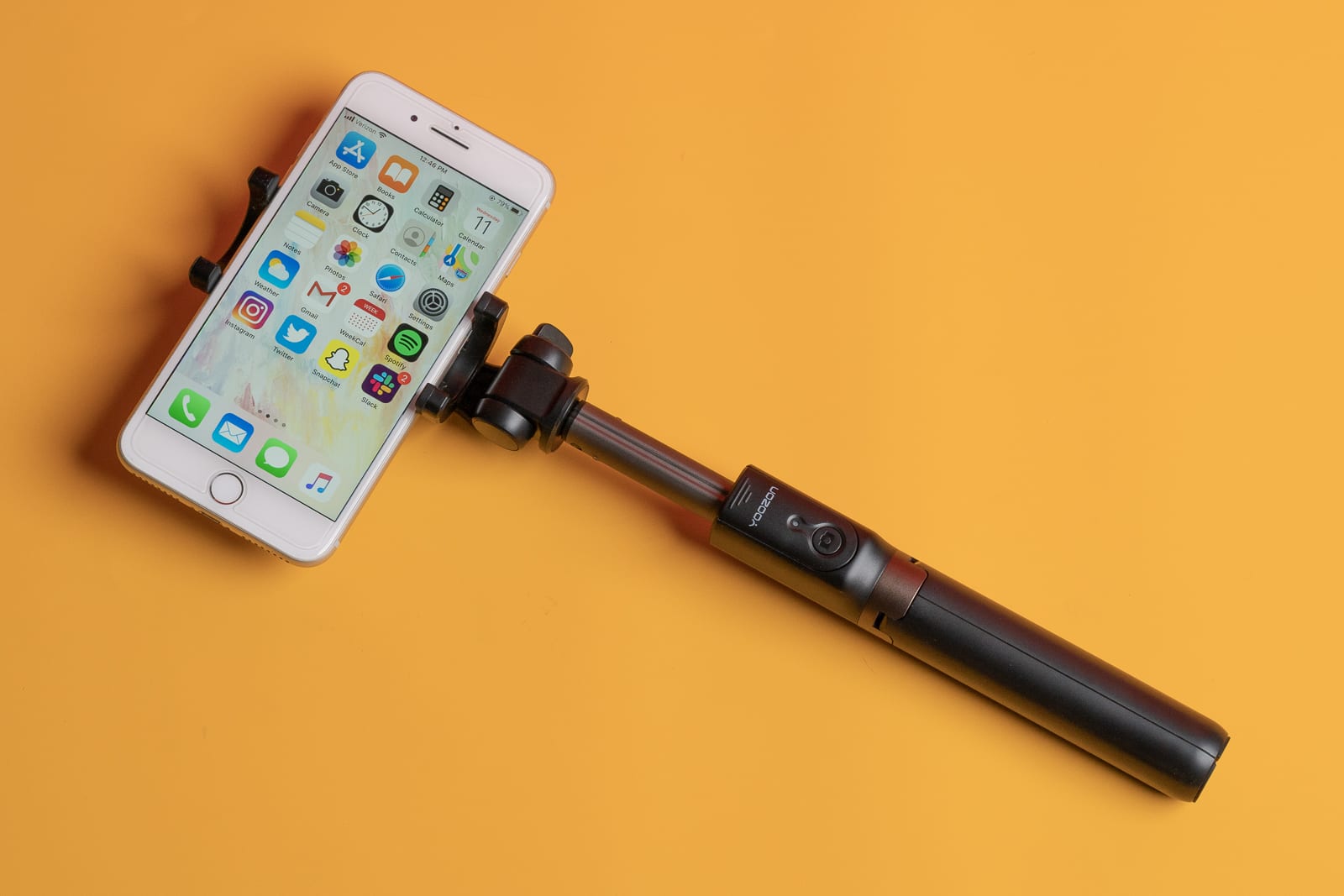
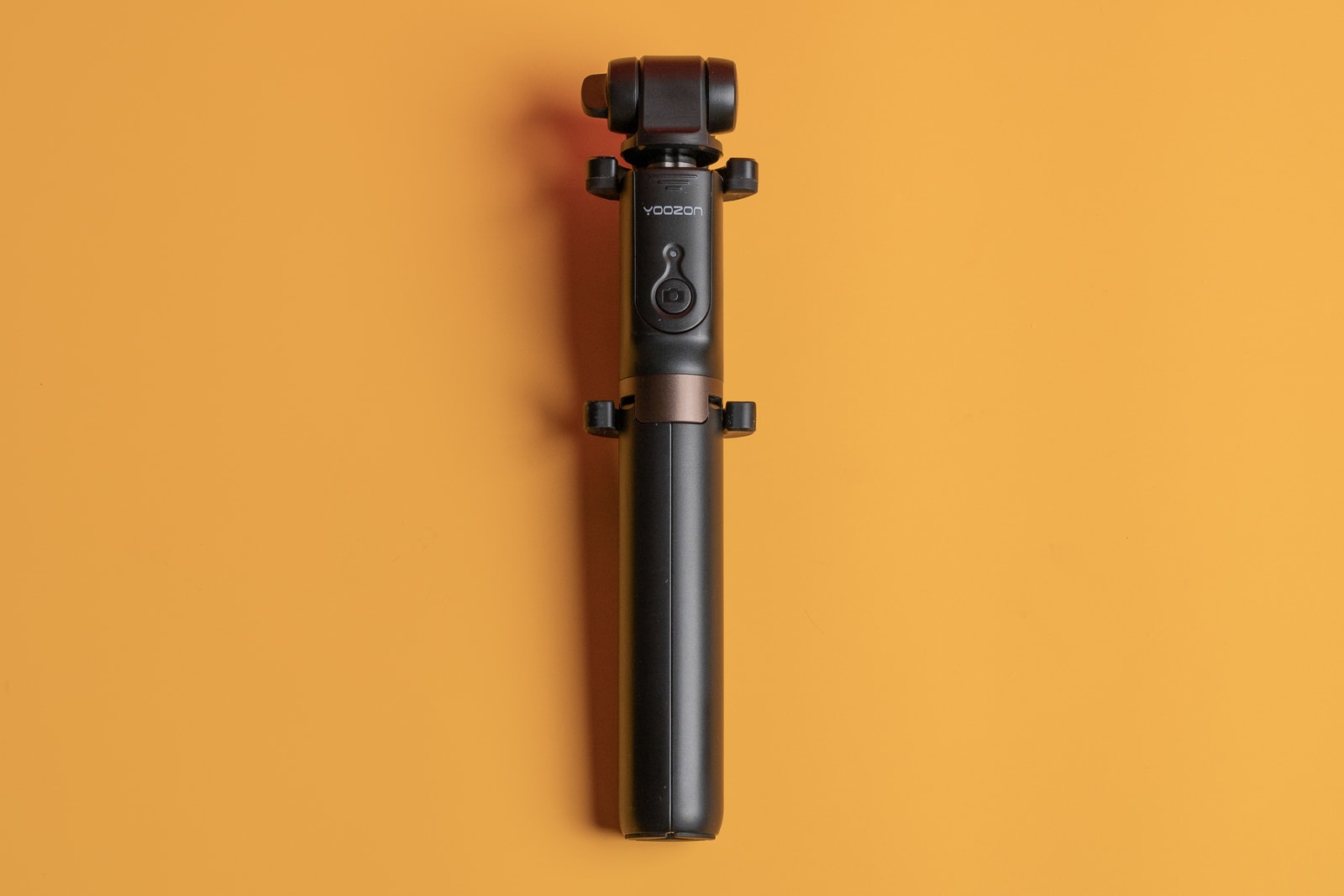
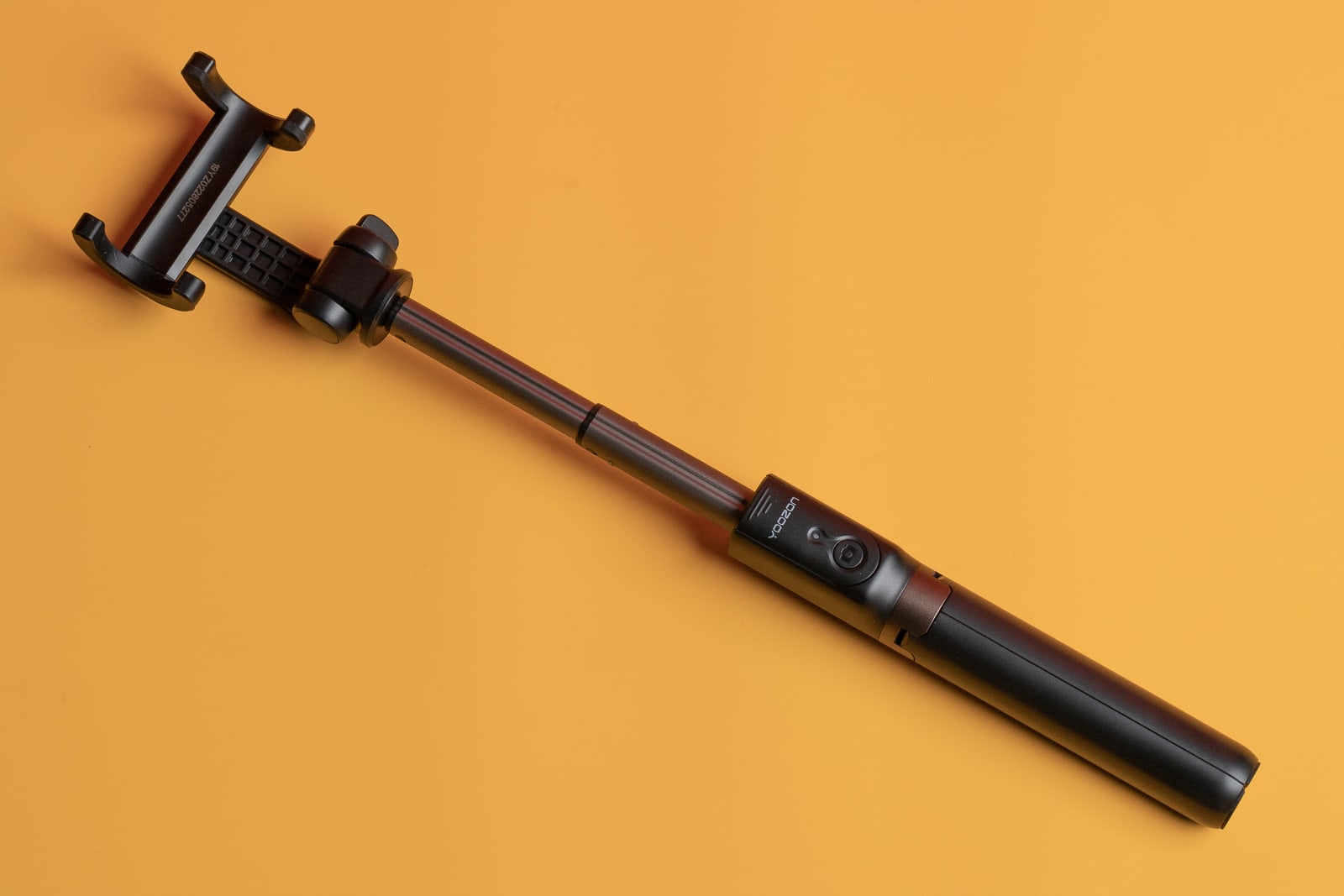
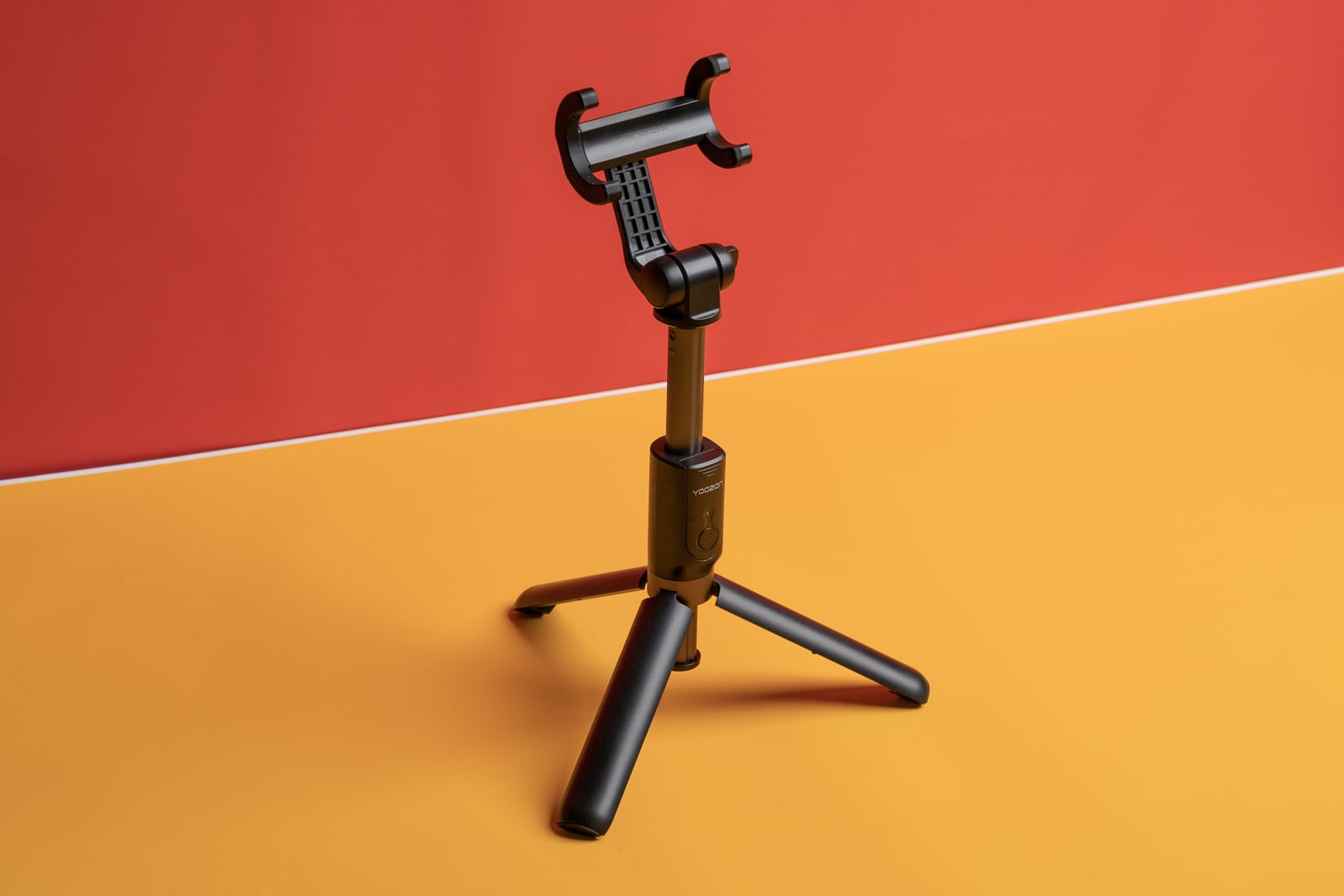
The competition
MountsA former runner-up pick, the Joby GripTight One Mount, comes standard on many Joby smartphone tripods. The simple spring-release design folds to the size of a large car key and is fast to use. But we found it didn't hold phones as securely as the Square Jellyfish mount; we had to be careful about installing the phone or risk it twisting out and falling.
The Vastar One mount tied the Square Jellyfish mount for stability and security. It's also cheaper, so it's a great option if you're trying to spend as little as possible. However, it's much larger and clunkier, and it takes longer to attach it to a phone.
MeFoto's SideKick360 Plus mount is about the size of a corkscrew-style wine opener, significantly larger than our key-size top pick.
We found that the RetiCam mount offered the functionality we wanted but was much bulkier than the Square Jellyfish model we picked.
The newest version of the Glif is far better than the first, but we still can't justify this nifty mount's price.
Tripods
The Joby HandyPod Mobile pairs a short tripod with a Joby GripTight One Mount. Its legs fold together to form a smooth handle that's more comfortable to use as a selfie stick than the jointed legs of a GorillaPod, but its lack of flexible legs also means it can't grip tree branches or sign poles. We decided to dismiss it because the Square Jellyfish mount is more secure than the GripTight One Mount. We dismissed the Manfrotto Pixi Mini for similar reasons.
Joby makes many tripods with bendy legs, but their mounts aren't as secure or easy to use as the Square Jellyfish mount. As a result, we think it's a better idea to buy the GorillaPod 1K and pair it with the Square Jellyfish mount. The Joby GripTight GorillaPod Pro 2 is large and strong like the GorillaPod 1K and has the added feature of a cold shoe adapter for accessories like mics or lights, but it lacks a ball mount. The Joby GripTight One Magnetic Impulse, Joby GripTight Action Kit, and Joby's GorillaPod 325 have shorter legs, which means they aren't as strong and can't grip as many objects.
The ChargerCity MegaGrab2 Selfie Kit, which used to be our budget pick, provides plenty of support, collapses easily into a small carrying bag, and costs less than half the price of the Joby legs and Square Jellyfish mount combined. But it's less supportive and not as well-built. It also squeaks horribly during adjustment.
The MonoShot (the brand-name model we tested, though many nearly identical versions are available on Amazon) extends to nearly 6 feet but sways in the slightest wind at that height—just what you don't want for your time-lapse.
Kenu's Stance smartphone tripods are the only kind we've seen that use either your iPhone's Lightning port or the Micro-USB or USB-C port of your Android or Windows phone as a mount. Though interestingly designed, the Stance models are less stable and work in fewer positions than our main picks.
The UBeesize tripod and mount combo is an Amazon best seller and even cheaper than our budget pick, but it's far flimsier.
This guide may have been updated by Wirecutter. To see the current recommendation, please go here.
When readers choose to buy Wirecutter's independently chosen editorial picks, Wirecutter and Engadget may earn affiliate commissions.
by: via https://www.AiUpNow.com/
